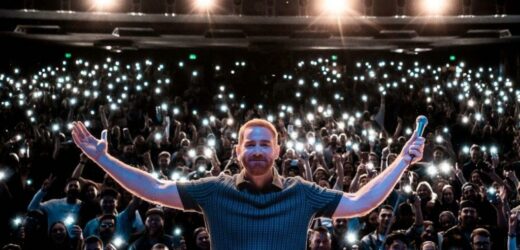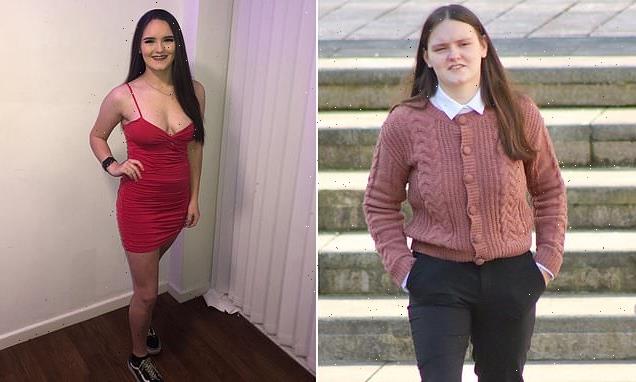Midway through his new Netflix special, “Cheeseburger,” Andrew Santino breaks the fourth wall.
“You have to recognize you’re as much a part of this as we are,” he says to the audience. “You’re responsible, too.”
Then, in the special’s final, cleverly constructed joke, Santino proves it. It’s a trick that calls back to the central thesis – and title – of the comedy hour. Audiences are an active participant in crafting jokes, whether they know it or not. Comedy is a cheeseburger, he says, and everyone’s tastes a little different depending on how they build it in their minds.
Santino, who also stars in the Lil Dicky-led comedy series “Dave” and the recently released “House Party” remake, sat down with Variety to discuss his “Cheeseburger” theory, as well as why he decided to wade into political jokes and the Dave Chappelle controversy in his new special.
When did you come up with the idea to do a major fourth wall break in the middle of the special, where you introduce this concept of the cheeseburger?
The story that I told about the cheeseburger – about having a mental break – was super powerful in my life. And I wanted to put that in there because it kind of found its way into the narrative of the special. As corny and stupid as the name of the special is, there is some real depth to what I’m trying to say. The audience is just as much a part of comedic performance as the comedian is. You make your version of your own cheeseburger. You put the toppings on that you like. You decide you don’t like pickles, well, then you don’t like that one joke. And you love tomato. So you love that one joke. And that was kind of this metaphor that was birthed from a real incident that happened. I was having a really tough time in life, with chunks of bad news. And I had a little bit of an emotional breakdown. Something I was trying to convey is that I just wanted to be something simple and fun. Comedy is complex, entertainment is complex. We are complex people, sometimes we’re not given room to be vulnerable and emotional in real life. They just want you to always be a comedian, and the criticism that entertainers face sometimes is stupid and hypocritical, because people in the real world don’t ever have a light shined on their issues. So it was me saying, “I just want to be a cheeseburger. I just want you to like me while you have me, and just be delicious and fun.” That’s it. I don’t need some grandstand, live forever, build me a statue in the middle of a town square… I just want you to like me right now. The narrative thread throughout the entire special is like, “This is all for fun. None of this is real. These are just jokes, and who cares.”
You stress the idea that audience members are building their own “cheeseburgers” when watching you perform, and they apply their own meaning to each joke based on a number of factors. Does the idea that people bring their own interpretations to your jokes – and may take them the wrong way – ever worry you?
In the special, I speak very candidly about the idea that there is this fake narrative where people are like, “Comedians can’t say anything anymore!” That’s not true. You can say whatever you want. There’s repercussions to some of your language, obviously. But I’m never afraid of saying something because it’s a joke. I get paid to joke around. So if you’re gonna give me money to make fun of stuff, don’t be shocked when I say something that’s off-kilter or weird. The whole idea of what we’re doing is to say things that are unusual, funny, obscure… Otherwise, why are you paying me money? Also, I’m not afraid of language because there’s no hate in my jokes. Truly, if you can feel me and see me and know me, you can tell that none of this comes from a bad place. This is all in jest. I don’t think I’ve ever really tried to go out of my way to say something just to be cruel or mean or super shocking. The world is so chaotic and scary and sad sometimes. We have to remember these things are for fun.
The “I can’t say anything anymore” bit seems to be the new hacky thing in comedy.
It’s funny… I hate the word hacky, because I think the word “hacky” is hacky. Any joke can be hacky. Everything is funny if you need it to be. Ellen DeGeneres had a joke years ago about pressing an elevator button after somebody else pushed it. You could argue that’s a hacky joke, other people have done it, blah, blah, blah. But she did it her way and it was funny. Everyone’s jokes have been done a million times, it’s about how you do an original concept of the idea. But it’s silly when comics do this thing like, “I’m a bad boy… I’m gonna say something bad.” Just tell your jokes.
You poke fun at Trump, Biden and Kamala Harris in the special. Are you ever wary of alienating part of your audience with political jokes? Is it a tricky tightrope to walk, and do people get angry about it?
Everyone is fair game in the political world to me. Trump people are mad at me for saying that nobody tried to kill him for all four years. It’s a joke – I don’t want anyone to get killed. I was just surprised nobody tried! The Trump backlash is more aggressive. People online are like, “Someone should assassinate you!” Which is insane. Trump’s side tends to be more like, “Someone should shoot you in the streets!,” while the Biden side is a little more like, “Why would you do something like that? You’re a loser.” But no, I don’t care about the alienating. If you don’t get that I’m kidding, I don’t need you as a fan.
In a time when comedians are coming under fire for offensive material in their specials, how would you respond to those who might say the cheeseburger theory puts too much of a responsibility on the audience, when you’re the one onstage with the microphone?
Audiences are free to respond how they feel about the material. I’m not putting the onus on the audience – I’m saying you’re a part of it as much as I’m a part of it. Comedy is a shared experience. Your preconceived notions of the world construct how you receive things – your race, your gender, your age, your socioeconomic status. All of that you bring to the comedy show. I’m leading the horse to water and showing them what they’re drinking. I’m giving you the material, but you’re building it. We’re just comics. I’m not standing on a platform telling you you have to feel this way or you have to agree with me. I’m just joking about nonsense in the world.
You mention Dave Chappelle in the special, and you say that the beauty of the world we live in is that he can say whatever he wants, and people can respond however they want. Obviously streamers play a huge role in the propagation of comedy nowadays. You worked with Netflix, which put out the controversial Chappelle special “The Closer,” which ignited protests and an employee walkout over jokes about trans people. How was Netflix as a partner – and why did you want to bring up Chappelle in the special?
I have nothing bad to say about Netflix. They were like, “Hey man, go do your thing.” They didn’t say, “You can’t say that. You can’t talk about that,” which tends to happen at other companies. I wanted to talk about Dave Chappelle in the special to give it some levity, in the sense that there is a ridiculous nature to it. People were enraged, and I say very specifically in the special that people have a right to be upset at him. They’re allowed to say, “I don’t like that kind of speech.” But I don’t think censorship of comedy is a healthy place to be. What is the barometer for what we’re allowed to say? You cannot bar him from expressing his feelings as an entertainer. Then we get into speech control, and that’s a little weird, unless you’re inciting violence. Then you get into the legal world, and that gets a little shaky. Dave is a comedian. I don’t think there’s hate in his heart. I don’t believe he hates a group of people. Now, I don’t know on a personal level, I just don’t feel that to be true. There’s a difference between how a dictator speaks about a group of people and how a comedian speaks.
Joking about [the Chappelle controversy] was something that I toiled over including, but I’m glad that I did. I sympathize with people who feel marginalized, who feel that it’s adding fuel to the fire. That’s not lost on me as a human. But as a comedian, I wonder if people occasionally take us for more than comedians. I don’t think jokes are always a reflection of how people feel.
It was announced last week that “Dave” Season 3 will premiere in April. What can we look forward to in this season, and does it start right where Season 2 left off?
No, not in a linear fashion. Time has passed, things have changed. I don’t think we talk about how much time has passed, but now we’re on tour, and so much crazy stuff goes down on the road. We travel to different parts of the country, and we really put a spotlight on what that’s like on Dave’s level, which is selling small music venues. We’re not doing theaters or arenas at this point. And you’re seeing a man who’s looking for love on tour, and all of the people around him trying to facilitate that. And you can look forward to an unbelievable amount of guest stars. Megan Fox, MGK and Don Cheadle… and I’m naming the ones that they emailed me that I could say, because there’s four of them that are the biggest stars you’ve ever seen do something like this, in my opinion. We can’t talk about it, but it’s a pretty incredible surprise.
This interview has been edited and condensed.
Read More About:
Source: Read Full Article


